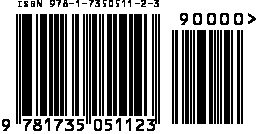All writers, but especially self-published authors, should understand what an ISBN is and why it’s important. Here are the answers to six important questions about ISBNs to get you started.
1. What is an ISBN?
ISBN stands for International Standard Book Number. It is a ten or thirteen character number that uniquely identifies a particular edition and format of a book. The 10-character numbers were the original format, but in 2007, the 13-character format replaced it.
Bookstores and resellers use the ISBN for inventory and ordering purposes, and industry watchers use it to track a book’s sales.
The number has five segments.
- The first is a 3-digit prefix which is always either 978 or 979.
- The second element is the registration group, which identifies the country where the number was issued. It will be between one and five digits in length.
- The third identifies the registrant, which is the publisher or imprint. This is important, and you’ll see why later on.
- The fourth element identifies the edition and format, and it may be up to six digits long.
- The fifth element is a check digit that is used to ensure that the ISBN is valid.
2. Where Can I Get an ISBN?
ISBNs are governed by an international organization appropriately called ISBN International. The organization authorizes specific entities within a country to issue ISBNs. In the US, the only authorized agency is a company named Bowker, which sells the numbers to authors and publishers.
Other countries have multiple entities that can issue ISBNs, and in some countries, ISNBNs are available for free, although they are still registered and controlled by the authorized entity.
3. What About Free ISBNs?
Some self-publishing platforms will provide a free ISBN if you publish on that platform. However, remember that the third ISBN segment identifies the publisher, which means the book will be identified as published by that platform.
If you decide to move your book to another platform, you will probably need to get a new ISBN number, even though nothing else about the book changes.
4. Can I Reuse an ISBN?
Nope. Once an ISBN has been assigned to a book, its permanent. You can make minor edits and change the cover without needing a new ISBN, but you can’t change the size, the binding, the edition, or a substantial portion of the text. Or pretty much anything else, right down to the color of the paper your book is printed on.
5. Do I need to Buy a Barcode to Use with my ISBN?
No. Many people don’t realize that bar codes are actually just a specialized font, so there’s no real magic to generating one as long as you know which bar code font to use. (There are many bar code fonts).
Most self-publishing platforms will automatically generate the bar code from your ISBN number and put it in the proper location on the cover for free, so you don’t need to buy them from Bowker.
6. Does an e-book require an ISBN?
Well, yes and no. Most self-publishing platforms will let you publish your e-book without an ISBN. They assign their own number for identifying your book in their inventory or sales analyses. On Amazon, for example, this is called an ASIN (Amazon standard identification number). Every item sold on Amazon is assigned an ASIN.
But without an ISBN, your book, even in e-book format, can’t be sold cross platform, which means even if you check “expanded distribution when you publish your book, it’s only going to be sold on that one platform.
So, an ASIN or equivalent on another platform is free, whereas an ISBN will cost about $125. If you think your off-platform sales will never exceed that amount, you can skip the ISBN. But why would you bet against yourself like that?
Sharon Ward is the author of the traditional mysteries In Deep, Sunken Death, and Dark Tide, and the forthcoming Killer Storm, all part of the Fin Fleming Sea Adventures Thriller series.
Sharon was a marketing executive at prominent software companies Oracle and Microsoft before starting her writing business. She was also a PADI certified divemaster who has hundreds of dives under her weight belt.
Sharon is a member of Sisters in Crime, MWA, ITW, Grub Street, and the Cape Cod Writers Center.
She lives near Cape Cod with her husband Jack and their miniature long-haired dachshund Molly.


Very good stuff. I was unclear about this.
Question: can you pub on Amazon and later when you go wide then get an ISBN for your ebook?
Yes, you can do that. It’s not a problem at all. I publish my print books under multiple ISBNs so I can easily track sales across platforms. The downside of this practice is that my total sales don’t show up in any industry trackers, because they see each ISBN as a different book.
The same thing will happen with an ebook. Amazon will continue recording sales under its ASIN, and your other platforms will track under the identifier they use.
You should know though that most self-publishing sites will not let you publish a book with a “used” ISBN, so if you’re going to switch to multiple sites (go wide) and you want to use an ISBN at that time, you may need multiple ISBN’s anyway.
Or you can go with an aggregator site like Draft2Digital. They distribute widely and don’t require you to supply an ISBN. But remember–that makes them the publisher of record.
Also, if you only want to sell in the US, with B&N, Apple, & Amazon you’ve got about 90% or more of the market for ebooks covered.
And each of those platforms will also distribute globally, but unless you’ve got a huge marketing budget, don’t expect too much in International sales.